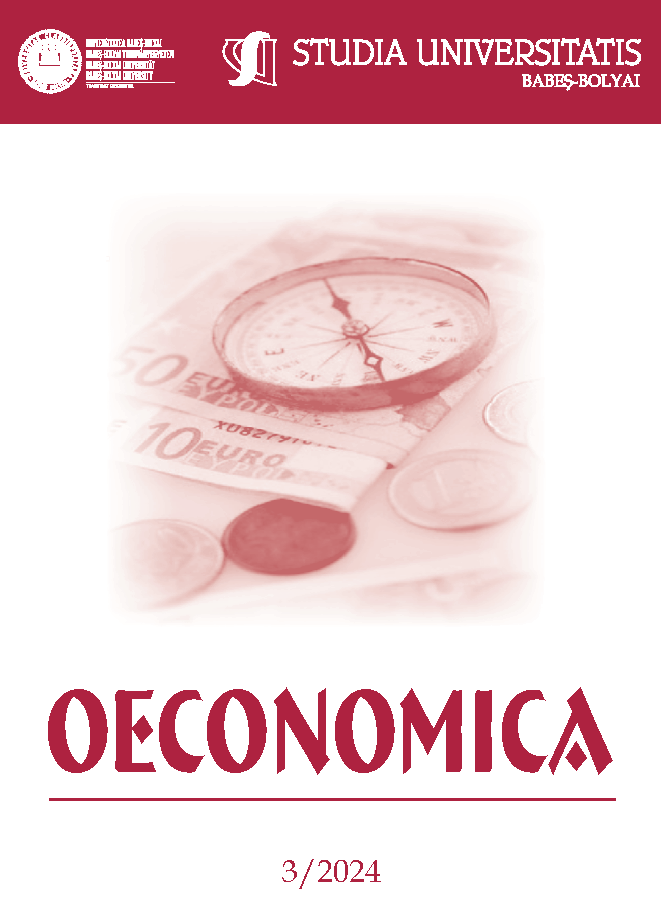CULTURAL TIGHTNESS-LOOSENESS AND STOCK MARKET INTEGRATION
DOI:
https://doi.org/10.2478/subboec-2024-0014Keywords:
foreign portfolio investments, foreign bias, unfamiliarity, cultural tightness/loosenessAbstract
This study examines the relationship between Cultural Tightness-Looseness (CTL) and stock market integration, focusing on a sample of 36 markets from 2004 to 2022. The analysis demonstrates that “loose” cultures, characterized by greater social flexibility, exhibit higher levels of financial integration with the global market. This relationship remains robust after controlling for alternative cultural determinants, such as genetic distance and Hofstede’s dimensions. Additionally, the study investigates CTL’s moderating effect on the relationship between global uncertainty and stock market integration. The findings reveal that in “loose” countries, the impact of global uncertainty on integration is less pronounced, suggesting a buffering effect. The results, validated through alternative specifications and robustness tests, extend the literature by identifying CTL as a unique cultural determinant of financial integration, distinct from long-term cultural barriers like genetic distance. These insights have implications for understanding market behavior under varying cultural and uncertainty conditions.
JEL Classifications: F15; F36; G15; O50
References
Alesina, A., Devleeschauwer, A., Easterly, W., Kurlat, S., Wacziarg, R., 2003. "Fractionalization." Journal of Economic Growth, 8, 155-194.
Bekaert, G., & Harvey, C. R., 1995. "Time-Varying World Market Integration." Journal of Finance, 50(2), 403-444.
Bekaert, G., Harvey, C. R., Lundblad, C. T., & Siegel, S., 2011. "What Segments Equity Markets?" Review of Financial Studies, 24, 3847-3890.
Claessens, S., & Laeven, L., 2003. "Financial Development, Property Rights, and Growth." Journal of Finance, 58(6), 2401-2436.
Enke, B., 2019. "Kinship, Cooperation, and the Evolution of Moral Systems." The Quarterly Journal of Economics, 134(2), 953-1019.
Eun, C. S., Wang, L., & Xiao, S., 2015. "Culture and R2." Journal of Financial Economics, 115(2), 283-303.
Fernandez, A., Klein, M.W., Rebucci, A., Schindler, M., & Uribe, M., 2016. "Capital Controls Measures: A New Dataset." IMF Economic Review, 64(3), 548-574.
Guiso, L., Sapienza, P., & Zingales, L., 2006. "Does Culture Affect Economic Outcomes?" Journal of Economic Perspectives, 20(2), 23-48.
Hofstede, G. H., Hofstede, G. J., & Minkov, M., 2010. Cultures and Organizations: Software of the Mind. McGraw-Hill, New York.
Kose, M. A., Prasad, E., Rogoff, K., & Wei, S., 2009. "Financial Globalization: A Reappraisal." IMF Staff Papers, 56(1), 8-62.
La Porta, R., Lopez-de-Silanes, F., Shleifer, A., & Vishny, R. W., 1997. "Trust in Large Organizations." American Economic Review, 87(2), 333-338.
Lehkonen, H., 2015. "Stock Market Integration and the Global Financial Crisis." Review of Financial Studies, 19, 2039-2094.
Obstfeld, M., & Taylor, A. M., 2004. Global Capital Markets: Integration, Crisis, and Growth. Cambridge University Press.
Pukthuanthong, K., & Roll, R., 2009. "Global Market Integration: An Alternative Measure and Its Application." Journal of Financial Economics, 94, 214-232.
Stulz, R. M., 1999. "Globalization, Corporate Finance, and the Cost of Capital." Journal of Applied Corporate Finance, 12(3), 8-25.
Stulz, R. M., 2005. "The Limits of Financial Globalization." Journal of Finance, 60(4), 1595-1638.
Todea, A., 2022. "Ancestry Barriers to the Cross-Border Diffusion of Global Market Information." Financial Research Letters, 49, 103151.
Todea, A., & Todea, A., 2023. "Genetic Distance and Stock Market Integration." Journal of Behavioral and Experimental Finance, 39, 100827.
Todea, A., & Harin, C., 2024. "The Influence of Cultural Norms on International Equity Allocation." The European Journal of Finance, 30(12), 1362-1385.
Uz, I., 2015. "The Index of Cultural Tightness and Looseness Among 68 Countries." Journal of Cross-Cultural Psychology, 46(3), 319-335.
Downloads
Published
How to Cite
Issue
Section
License
Copyright (c) 2024 Studia Universitatis Babeș-Bolyai Oeconomica

This work is licensed under a Creative Commons Attribution-NonCommercial-NoDerivatives 4.0 International License.



